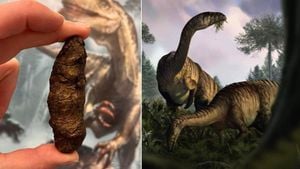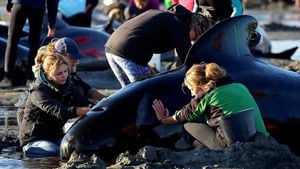Scientists have made headlines recently with their remarkable findings surrounding the asteroid Ryugu and the unexpected life forms discovered on its surface. The discovery raises intriguing questions about contamination, microbial resilience, and our quest for extraterrestrial life. The samples were retrieved by Japan's Hayabusa2 spacecraft, which successfully collected these precious materials during its mission to the 200 million-mile distant asteroid.
Launched back in December 2014, the Hayabusa2 spacecraft rendezvoused with the asteroid Ryugu in June 2018, spending roughly one year collecting samples from the surface. After endeavoring to scoop material from the asteroid, these samples were returned to Earth on December 6, 2020. The hope was to analyze them for clues about the origins of life and the solar system itself. Yet, the research team encountered something rather surprising: microbial contamination.
Recent studies revealed rapid microbial colonization on the surfaces of these space-returned samples. Within just one week of being exposed to Earth’s atmosphere, the samples displayed microbial life, primarily consisting of common soil bacteria like Bacillus. These bacteria appeared on the rock shortly after it was opened and spread rapidly, indicating they were likely not present before the sample was retrieved from space.
This led researchers to wonder: how could such stringent contamination controls fail? The samples were handled inside ultra-clean environments, utilizing sterilized tools and nitrogen atmospheres to prevent any contamination from Earth. Despite all these precautions, it seems life found its way onto the rock.
Matthew Genge, team leader and palaeontologist at Imperial College London, explained the findings succinctly, stating, “We found microorganisms in a sample returned from an asteroid. They appeared on the rock and spread with time before finally dying off.” These unforeseen results prompt important reflections on how we conduct cosmic exploration.
Microorganisms are, by their nature, incredibly adept at survival and replication. The adaptability of these terrestrial microbes highlights their role as nature’s greatest colonizers. No matter where life finds itself, or the environment it must adapt to, life often persists and at times flourishes—even under what appear to be stringent biosecurity protocols.
The presence of terrestrial bacteria on the Ryugu sample is not just fascinating; it raises ethical and procedural questions about future space missions. Could contamination from Earth mislead scientists, hindering the search for genuine extraterrestrial life forms? Genge points out this risk, stating, “The fact terrestrial microbes can colonize makes it hard to ascertain whether the materials we recover are genuinely alien or simply contaminated.” His concerns echo the sentiments of many researchers eager to explore the cosmos yet remain vigilant about contaminate the process.
Similar contamination challenges are not confined to Ryugu. Understanding how Earth organisms adapt to and flourish on extraterrestrial materials will be imperative for future missions, including those involving Mars and the Moon. Instruments and protocols must evolve to bolster planetary protection measures, ensuring sample integrity and reducing the chances of Earth-based life infiltrATING potential samples from other celestial bodies.
For space enthusiasts and scientists alike, the Hayabusa2 mission has sparked discussions not only about life on Earth but also about our approaches to investigating life beyond our planet. Historically, the presence of organic materials within meteorites and asteroids has fueled theories about life's origins. The tricky part lies with potential contamination. Discovering signs of life—whether microorganisms or otherwise—on samples from extraterrestrial locations does not necessarily mean those life forms began their existence there.
The exploration of the cosmos is one of humanity's greatest quests, but with every breakthrough brings awareness of the fine line between discovery and contamination. Scientists are committed to refining their methods when examining asteroid samples and ensuring the integrity of their findings. This commitment is driven by their zeal to answer questions about the potential for life on other planets.
For researchers, the Ryugu findings serve as both inspiration and cautionary tales, pushing them to think creatively about their processes. The microbial colonization found on the asteroid sample demonstrates just how resilient and dominant Earth-based life remains, leading to calls for heightened vigilance.
Going forward, many scientists express enthusiasm about analyzing more extraterrestrial materials, with the hope of doing so without contamination from terrestrial organisms. The lessons from Ryugu will inform future explorations and spotlight the necessity of rigorous protocols to prevent any microorganisms from our planet from muddying the waters of discovery.
While these findings are undeniably fascinating, they also bring us back to the age-old question we’ve pondered since the dawn of our exploration: how do we distinguish the life forms found from those originating from Earth versus those solely from other celestial bodies? The quest for the answers continues as we venture through the vastness of space, driven by our relentless pursuit of knowledge about life beyond our own.



